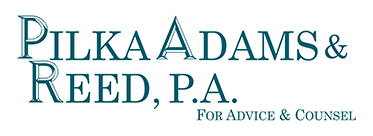Associations’ Fiduciary Duty To Pursue Delinquencies
By Daniel F. Pilka
Homeowners associations and condominium associations all over the country are
still feeling the financial crunch created by owners who fail or refuse to pay their
assessments on a timely basis. As a result, the associations are forced to cut back on the
services rendered or rely on special assessments against paying members to make up for
the deficit.
Under these circumstances, homeowners and condominium associations have an
obligation to do everything possible to collect these delinquent and unpaid assessments
before even considering cutting off services or imposing special assessments to make up
the deficit from paying members. In fact, the association’s board of directors have a
fiduciary duty to the membership to implement an aggressive collection strategy to recover
from the delinquent property owner. This obligation is further heightened by the current
foreclosure environment, coupled with Florida Statutes, §718.116 and §720.3085, which
limit the liability of first mortgagees and/or their assigns for unpaid assessments.
In order to satisfy its fiduciary duties to diligently pursue unpaid and delinquent
assessments, association needs to establish a collection policy and distribute this policy
to all owners. This policy should include the amount of the unit or lot owners’ assessments
and the due date. This policy should also include the consequences to the owners for
failure to pay their assessments in a timely manner. Depending on the authority of the
association’s governing documents, the association may assess late charges and/or
interest against the delinquent owner. The board may also choose to include information
as to when the delinquent account would be forwarded to the association’s attorneys for
collection and that all attorney fees incurred by the association will be assessed against
the owner, as provided by Florida Statutes and the association’s governing documents.
Once this policy is distributed to owners, uniform enforcement is critical to the board’s
success. The board should work with the association’s managers and attorneys to ensure
uniform implementation of the policy.
However, this is not to suggest that the association act heartlessly or without
consideration to the financial pressure being faced by the property owner. At the outset,
the property owner should be given the opportunity to work with the association to work
out a payment plan that serves both the interest of the association and the delinquent
homeowner. However, if not responded to within a set time period not to exceed 30 days,
then the matter should be placed into formal collection status.
The first thing that any association needs to do before pursuing formal collection
is to send a notice of intent to lien letter to the delinquent owner. Typically, this letter will
either be sent by the management company, or if the association is self-managed, by the
association’s treasurer. This letter serves as both a warning regarding the imminent filing
of a lien against the unit owner and the final non-legal requests for the owner to become
current in payment of their assessments.
If the delinquent property owner fails to respond to the notice of intent to lien letter
within the time period prescribed by the applicable statutes, then the matter must be
referred to the association’s legal counsel who at that point records a lien against the
property owner’s unit or property. This is the most important action the association can
take because it secures payment of the delinquent assessment and acts as a final “wakeup
call” for the delinquent owner.
Because there are strict and explicit requirements for valid condominium and
homeowner association liens, the preparation, recording and service of the lien must be
handled by the association’s legal counsel. If the association or the management
company attempts to prepare and file the lien itself, either the association or the
management company will be guilty of the unlawful practice of law.
In conjunction with the filing of the lien, the delinquent property owner will then be
given a last notice to avoid foreclosure. At this point, the board of directors will face its
most difficult decision in directing its legal counsel either to begin the foreclosure action
on the lien or to initiate collection actions. Typically, there are several factors that the
association will need to take into consideration in deciding whether to foreclose on a
property or to simply seek a money judgment. Factors to be considered by the association
in deciding whether to foreclose upon the property include whether or not the property is
already in bank foreclosure, whether the association has the ability to manage and rent
the property if they take title to it in foreclosure, and the cost and expense the association
would have to incur in order to place the property in good physical condition for it to be
rented out. As such, the decision whether to foreclose on the delinquent property or to
seek a money judgment must be made on a case-by-case basis. In any event, the
choosing of the correct enforcement mechanism requires close analysis of the factual
circumstances and is best left to the discretion of the association’s attorney.
More so today than ever before, it is imperative that the association diligently and
timely take all actions available to it to collect unpaid delinquent assessments. It is only
through such diligence that the association can properly serve their membership and
community’s needs.

